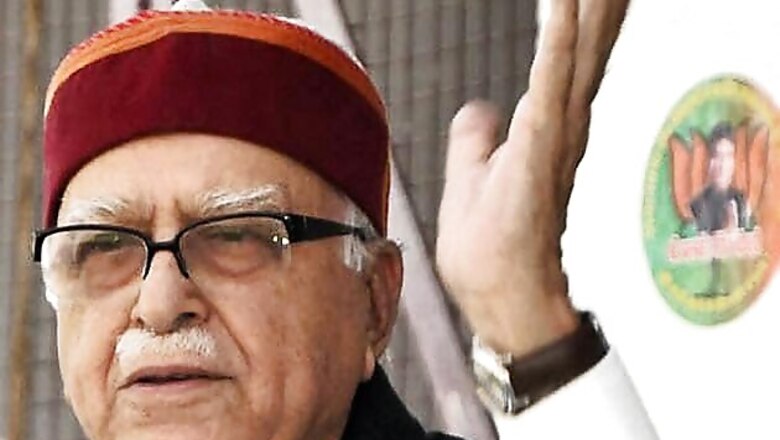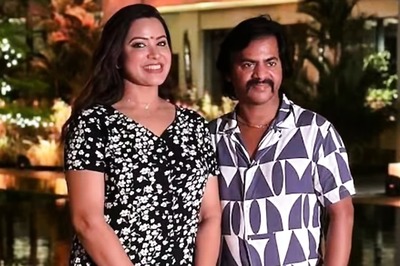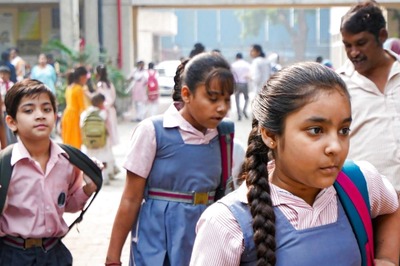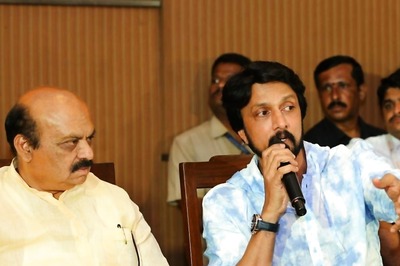
views
Lal Krishna Advani, the man who propelled the Bharatiya Janata Party (BJP) from an also ran to power in Delhi in just over a decade, on Thursday celebrated his 85th birthday and finally announced that he was not in the race to become the Prime Minister of India. Forced to play second fiddle to BJP patriarch and former prime minister Atal Bihari Vajpayee for a major part of his career, Advani never hid his political ambitions but failed to realise as first BJP allies and then the unforgiving electorates of India made sure that the one dream he cherished most would remain unfulfilled.
"The party has given me so much all my life that it is much more than becoming the prime minister," Advani told his colleagues at his residence in Delhi. The statement was perhaps made to acknowledge the fact that time was not on his side to become the prime minister of the country. At 85 and the next Lok Sabha elections still more than a year away, his dream is likely to remain just that.
The BJP is currently grappling with leadership crisis with corruption charges against its President Nitin Gadkari. While the RSS has come out in the support of Gadkari claiming he is "legally and morally clear", many senior BJP leaders like Ram Jethmalani, Yashwant Sinha and Jaswant Singh have demanded his resignation saying his presence in the party will make the BJP "morally weak".
Although Advani has not made any public statements against the BJP President, his absence from the Core Group meeting at the party headquarters in New Delhi on Tuesday is being seen as a signal that he is unhappy with Gadkari's continuation. Sources said that he was extremely upset with his colleagues for not acting against Gadkari.
As the next general elections near names of several NDA leaders are circulating as the potential prime ministerial candidate. But the big name missing is that of Advani, who for several years remained the prime minister-in-waiting and nursed an ambition of occupying the top most political position in the country. His initiation into the political discourse started when he joined the Rashtriya Swayamsewak Sangh in 1942 and his partnership with Vajpayee began in 1957. The duo took almost four decades to take the BJP to the zenith of its glory with Vajpayee becoming the prime minister and Advani his deputy.
Advani shot to prominence after he undertook the famous Ram Rath Yatra in 1990 which was linked to the Ram Janmabhoomi-Babri Masjid dispute in Ayodhya. Due to the massive polarisation on communal lines, the BJP managed to win a large number of seats in the Lok Sabha polls and become a major player in national politics. A few years later, the party formed the government as part of the NDA which included several parties who were primarily anti-Congress. Vajpayee was the moderate face of the BJP, which was the largest NDA constituent and he took over the prime minister of the country. Advani was relegated to the background as his radical image and the rath yatra were seen as a highly divisive force unsuitable for a multi-cultural country like India.
Although Advani first joined the government in 1977 after the Congress rout in the elections after the Emergency, his next shot at governance came only after two decades in 1998.
During the 2004 General Elections, Advani was confident that the NDA would return to power but instead the Congress-led UPA formed the government with Manmohan Singh taking over as the Prime Minister. After the 2004 defeat, Vajpayee decided to withdraw from active politics and Advani was elected the Leader of Opposition in Lok Sabha. He continued to be the Opposition leader till 2010 when he decided to pave way for Sushma Swaraj. Speculations were that Advani had to give away the post because many believed that like Vajpayee he should also withdraw from active politics after the BJP witnessed another defeat in 2009 General Elections.
So, almost after 70 years in active politics, the eternal yatri of India has seen the writing on the wall.
####



















Comments
0 comment